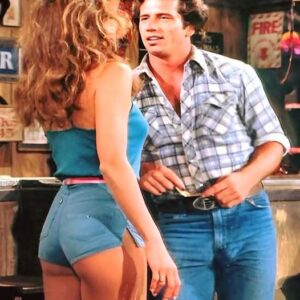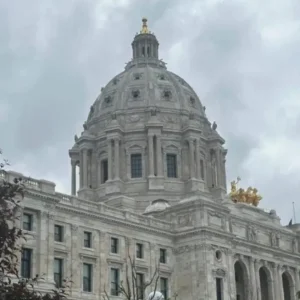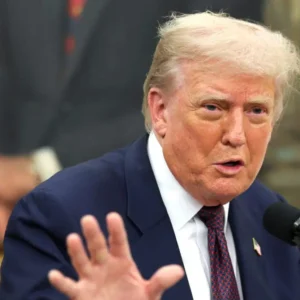Chapter 1: The Whisper That Shattered the Silence
I had spent eighteen years telling myself a story I thought was true.
That Charles, my husband—the love of my youth, the father of my child—was gone. Taken in a flash of twisted metal and flashing sirens. That he’d kissed my forehead, promised to be right back with milk and eggs, and never returned.
They told me it was a car accident.
They told me it was instant.
And I believed them.
How could I not?
There was a funeral. A closed casket, yes—but I was told there’d been trauma, too much damage to his face. His mother, Diane, made all the arrangements. She insisted on cremation. Swift. Quiet. Final. She told me to rest. To grieve in peace. She would “handle everything.”
I was twenty-three, barely hanging on. My daughter, Susie, was two weeks old. My body still ached from childbirth, my mind was fogged with sleep deprivation and sorrow.
And so I said yes.
To everything.
Yes to the closed casket.
Yes to the cremation.
Yes to the absence of questions.
I never saw his body.
And over time, I convinced myself that it didn’t matter. Dead was dead. Seeing his body wouldn’t have changed that.
Right?
Eighteen years passed.
Not all at once. Some days crawled like molasses, others flashed by in a blur of school drop-offs, birthday parties, scraped knees, and tearful teenage breakdowns. I raised Susie the best I could. Alone, but not unloved. Tired, but determined.
She grew into a beautiful, thoughtful girl with her father’s warm eyes and my quiet stubbornness. She asked about him sometimes—always gently, like she was afraid the memory might break me.
“What was he like?” she would ask, usually when I was least expecting it—while folding laundry, stirring soup, wiping down the kitchen counter.
I told her the same handful of stories. How he used to sing horribly in the car. How he made the world’s worst pancakes. How he would hold my face in his hands and whisper that we were going to be okay—even when we weren’t.
She never pressed for more.
But I could feel the hunger behind her eyes. The ache of a daughter who never got to say hello, let alone goodbye.
Then came the whisper that cracked everything open.
It was an ordinary Tuesday evening.
The kind of day where nothing in particular seemed poised to change your life.
I was walking past the hallway when I heard Susie’s voice. Soft. Tender. Almost reverent. She was speaking into the old landline phone we kept by the kitchen—a relic of my past I hadn’t the heart to toss.
“Okay… I miss you too, Dad.”
I froze mid-step.
My heart stuttered, my breath caught in my chest.
Dad?
I pressed myself against the wall, my entire body trembling. She saw me a moment later and startled, quickly hanging up.
The receiver clattered onto the base with a loud click that echoed in my ears.
“Who were you talking to?” I asked, my voice barely holding together.
Her eyes darted away.
“Wrong number,” she muttered and fled up the stairs before I could stop her.
I stood there for a long time, rooted to the floor.
There was no air in the room. Only the memory of that word—Dad—hanging heavy and sharp.
Wrong number? Not with that tone. That tenderness.
That knowing.
That night, I waited until she went to bed, then returned to the phone. My hands shook as I scrolled through the redial log. There it was. A number I didn’t recognize.
I stared at it for a long time.
Then I dialed.
The phone rang once.
Twice.
Three times.
I nearly hung up.
But then, I heard it.
Breathing. Male. Familiar in a way that made my stomach churn.
“Susie,” the voice said, warm and relieved, like they’d been speaking every night for years. “I was starting to think you wouldn’t call again tonight.”
My knees buckled.
My voice cracked through the static: “Who is this?”
Silence.
Then—click.
He hung up.
The line went dead, but my world had already started unraveling.
Because no matter how hard I tried to rationalize, deny, or explain it away, I knew that voice.
It was his.
Charles.
The man I buried eighteen years ago.
Chapter 2: Ashes That Never Were
I didn’t sleep that night.
I lay in bed staring at the ceiling, the shadows shifting like ghosts on the plaster above me. My mind spun in loops—trying to grasp something solid in a reality that had suddenly become a kaleidoscope of doubt.
The voice. It had been his. I would’ve known it anywhere.
It wasn’t just memory. It was muscle. Soul-deep recognition.
But how? And why?
I thought of the funeral again. The casket I never opened. The ashes I never scattered.
Were they even his?
Had I buried a stranger?
The next morning, I waited until Susie sat down with her toast before saying anything. Her eyes were puffy. She looked like someone who had been holding a secret so tightly it had started to press bruises into her.
“Sit down,” I said gently, placing a mug of tea in front of her.
She hesitated, but obeyed.
“I heard you yesterday,” I said softly. “I know you weren’t talking to a wrong number. And I need you to be honest with me now. Please, no more lies.”
She froze. The corners of her mouth quivered. For a second, I thought she might deny it again. Then she stood and disappeared upstairs without a word.
I stayed at the table, heart in my throat.
When she came back, she had something in her hands—a small, pale envelope, creased from being read too many times.
She placed it on the table and pushed it toward me with trembling fingers.
I opened it.
And the handwriting hit me like a truck.
Charles.
“Dear Susie,
If you’re reading this, it means I finally found the courage to reach out. My name is Charles. I’m your father.”
I didn’t breathe.
“I’ve followed your life from a distance. I panicked when you were born. I wasn’t ready. My mother helped me disappear. I thought I was doing the right thing… I see now how wrong I was.”
“I would like to talk to you. If you want to.”
There was a number at the bottom of the page.
I looked up at Susie, my eyes stinging.
“How long have you had this?”
“About six months,” she whispered. “He sent it through a private messenger. It was postmarked from a town three hours away.”
“Did he find you?”
Her shoulders sagged.
“No. I found him.”
The floor seemed to shift beneath me.
“I found him online,” she continued. “I searched one day. I don’t know why. Maybe because I was tired of pretending that the pictures you gave me were enough. I wanted more. I wanted to see him.”
Her voice cracked.
“I needed to see if I had his smile. His nose. His voice. If he ever thought about me.”
I blinked away tears. “And did he?”
She nodded.
“I called the number in the letter. I didn’t tell you because… I didn’t want to hurt you.”
I closed my eyes.
It did hurt. But not for the reasons she thought.
It hurt that Charles had chosen to contact her—and not me. That he let me bury a ghost. That he let me grieve for a man who was very much alive.
“I don’t understand,” I said. “I was told he died in a car accident. His mother made the arrangements. There was a death certificate. A funeral.”
“I know,” Susie said. “But he told me… it wasn’t real.”
I stood up, my chair scraping against the tile.
“Not real?” My voice rose, the tremble finally breaking into a storm. “The casket? The urn she gave me? What was in it, then—sand?”
Susie said nothing.
She didn’t need to.
The betrayal spoke for itself.
That afternoon, I drove across town to the cemetery. The headstone still stood—simple, gray, and stupidly dignified for a man who had orchestrated the greatest lie of my life.
Charles Edward Grant
Beloved Husband and Father
1979–2005
Beloved?
I wanted to tear the whole stone out of the earth with my bare hands.
Instead, I stared at it until the sun began to dip behind the trees. Until my hands went numb and my knees gave out.
He had let me grieve for eighteen years.
He had let our daughter grow up without a father.
He had let Diane destroy us.
That evening, I dialed the number from the letter.
He answered on the first ring.
“Allie,” he breathed. “I was wondering when you’d call.”
My name on his lips still had the power to stop my heart.
“Meet me,” I said. “Face to face.”
“Okay.”
“Tomorrow. Noon. That little coffee shop by 5th and Main. You know the one.”
He paused.
“Yeah,” he whispered. “I remember.”
“I’m not coming for closure, Charles,” I warned him. “I’m coming for the truth.”
And I hung up.
**Chapter 3: The Man in the Window Seat
The coffee shop hadn’t changed.
Same dusty windows. Same chipped mugs. Same quiet hum of espresso machines that always made the place feel like a small town trapped in time.
I arrived early.
I sat near the window, facing the door, my hands curled around a lukewarm cup I had no intention of drinking. I didn’t want to miss the moment he walked in—not because I was eager to see him, but because I needed to watch it happen. I needed to confirm with my own eyes that Charles Grant, the man I had mourned for nearly two decades, still had breath in his lungs.
The bell above the door jingled.
And there he was.
He had aged, of course. His shoulders were narrower, his hair thinner and tinged with gray. He moved with a limp, slight but noticeable. But the jawline was the same. The furrow in his brow as he scanned the room. The hands—those large, clumsy hands I used to tease him about when he tried to tie baby booties.
When his eyes landed on me, he froze.
Not in surprise.
In shame.
He approached slowly, cautiously, like a child who knows he’s in trouble and doesn’t know how deep.
“Allie,” he said, pulling out the chair across from me.
“I didn’t say you could sit,” I replied.
But he sat anyway.
We stared at each other in silence.
The air between us was heavy. Unforgiving. A mix of coffee, cinnamon, and seventeen years of unanswered questions.
“You have five minutes,” I said finally.
He nodded. “That’s fair.”
“Start talking.”
He rubbed his palms together, a nervous tic I remembered well. He used to do it when bills piled up or when Susie was teething.
“I didn’t die,” he said simply.
“No kidding.”
He flinched. “I wanted to disappear.”
“You did disappear.”
He swallowed. “My mother helped. You remember what she was like.”
“Manipulative. Controlling. Cold.” I ticked the words off like items on a grocery list. “You don’t get to use her as a shield.”
“I’m not,” he said quickly. “I just want you to understand… I wasn’t in my right mind.”
“You weren’t in our lives either.”
Charles looked away, out the window. “When Susie was born… I panicked. I felt like I was drowning. And Diane—she told me I wasn’t cut out for fatherhood. That I’d ruin you both. That I’d only hold you back.”
“So you faked your death?!” I leaned forward. “Do you even hear how insane that sounds?”
“She had connections. She worked in the mayor’s office. She knew someone who could push the paperwork through.”
“And the ashes?”
“She filled the urn with ash from a fireplace. I didn’t even know she’d done it until after.”
My stomach turned.
“Why didn’t you come back?”
He finally looked at me, his eyes wet and glassy. “I was going to. A week after the funeral. I drove past the house and saw you on the porch, holding Susie. You looked so tired. So broken. And I thought… I did that.”
“You could’ve fixed it.”
He shook his head. “I didn’t believe I deserved to.”
We sat in silence again.
I wanted to scream. To throw my cup at him. To pound my fists against his chest until he ached like I had.
But I didn’t.
I needed answers.
“What changed?” I asked. “Why now?”
“Because she found me,” he whispered. “And because for the first time in my life, I wasn’t afraid of the truth. I was afraid of never knowing her. Never hearing her laugh. Never knowing if she had my eyes.”
“She does,” I said quietly. “And my fire.”
He smiled. “I see that.”
“Why didn’t you come to me?” I asked.
“Because I thought you’d hate me.”
“I do,” I said. “But that’s not the point.”
He nodded. Accepted it.
“I’ll never be able to undo what I did, Allie,” he said, voice cracking. “I can’t go back. But I want to go forward. I want to be whatever she needs. A friend. A resource. A pen pal. Anything.”
“And what if she wants nothing?”
“I’ll respect that.”
“And if she wants everything?”
“I’ll give her what I have left,” he whispered. “Even if it kills me.”
For the first time, I believed him.
Not because he deserved it. But because Susie did.
“You’re going to pay child support,” I said. “Eighteen years’ worth. And you’re going to do it without a single complaint.”
He didn’t flinch.
“Done.”
“And you will never speak to her unless she wants you to. I will not let you hurt her again.”
“I understand.”
I stood.
He didn’t try to hug me. Didn’t ask for forgiveness.
He just nodded, quietly accepting his place at the bottom of the ladder he’d have to climb back up.
I walked away without looking back.
But I could feel his eyes on me the whole way out.
Chapter 4: Paper Trails and Broken Bridges
The paperwork was filed quietly.
No courts, no press, no public drama—just a binding agreement: eighteen years of missed support payments. A financial ledger of silence. Charles signed it without protest.
Each month after our meeting, like clockwork, a check arrived in the mail. Not late. Not postdated. Never with a note. Just a sum and a signature.
It wasn’t about the money.
It was about principle. About accountability. About making sure he never forgot the weight of what he’d abandoned.
At home, I kept things steady.
Susie, to her credit, never shut me out. She could’ve—God knows many daughters would have. But instead, she softened. Asked questions. Listened.
“What was he like before?” she asked one night while we sat on the porch, watching dusk settle over our quiet street.
“Before what?”
“Before he disappeared.”
I took a long sip of my tea.
“He was warm,” I said. “Not perfect. But generous. He had this way of making people feel like they were the only ones in the room.”
She nodded slowly. “Was he funny?”
I laughed before I could stop myself. “He thought he was. He used to tell these terrible dad jokes. Like, ‘Why don’t skeletons fight each other? Because they don’t have the guts.’”
She rolled her eyes, smiling. “That’s awful.”
“That’s your inheritance.”
As the weeks passed, her phone calls with Charles grew more frequent.
At first, they were stiff, cautious. Polite even.
“How was your day?”
“What kind of music do you like?”
“Did you watch that new show yet?”
But over time, I began to hear her laugh in ways I hadn’t heard since childhood. Small at first, then louder. Freer.
I stood in the hallway more than once, eavesdropping through the wall, torn between heartbreak and relief.
I wanted to hate it.
But I couldn’t.
Because she was happy.
One Saturday morning, she came downstairs in jeans and a soft sweatshirt, clutching a small envelope.
“I want to meet him,” she said.
I froze.
She said it gently, like someone offering a fragile truth. Like someone already bracing for a “no.”
“Okay,” I said.
“Really?”
“I’m not going to stop you, Susie,” I said. “But I’m going with you the first time.”
She exhaled, her shoulders visibly relaxing. “Thank you.”
“I’ll always protect you,” I added. “But I won’t stop you from finding your answers.”
The meeting was set for the following weekend. Neutral ground: a bookstore café in a town an hour away. Public. Safe. No memories.
She wore her hair down—something she hadn’t done in weeks. She didn’t fuss with her makeup, didn’t try to impress. She just wanted to be.
I drove her there in silence, my knuckles white on the steering wheel. She stared out the window, chewing her thumbnail—a habit I thought she’d outgrown.
“You okay?” I asked as we parked.
She nodded. “Nervous.”
“You don’t owe him anything,” I said.
“I know,” she whispered. “But maybe… maybe I owe myself something.”
Charles was already there when we arrived.
He stood as we walked in, holding a copy of The Catcher in the Rye, like some kind of bizarre peace offering. His hands trembled.
Susie walked toward him slowly.
I stayed back, just inside the café entrance, pretending to read a flyer about local poetry nights.
They didn’t hug. Not at first.
He extended his hand.
She looked at it, then brushed it aside and wrapped her arms around him.
He cried.
So did I.
Quietly. Silently. Behind my sunglasses.
Their meeting lasted two hours.
They talked. Laughed. He showed her old photos, bent at the corners. Told her stories I had long since forgotten—stories of our youth, of his childhood, of his fears.
She asked him the hard questions, and he didn’t dodge them.
At least, not all of them.
I watched from a distance, not as a mother, not as a betrayed woman—but as someone witnessing something extraordinary: the rebuilding of a bridge I thought had long ago fallen into the river.
On the drive home, Susie said nothing for a long time.
Then she looked at me and whispered, “He’s not who I imagined.”
“Is that good or bad?”
“Neither,” she said. “Just… different.”
I nodded.
“Thank you for letting me go,” she added.
I reached for her hand and gave it a squeeze. “I never let you go. I just stood back and let you walk forward.”
That night, I sat alone at the kitchen table.
I opened the last envelope from Charles—this one with a check like the rest, but a small note scribbled inside.
“Thank you, Allie. For raising her. For keeping her kind.
I’ll spend the rest of my life earning the right to know her.
—C.”
It wasn’t redemption.
But it was something close to human.
**Chapter 5: Rooms Without Ghosts
The first time Susie invited Charles to our home, I wasn’t there.
She asked me ahead of time—kindly, respectfully—but clearly.
“I think I want to show him where I grew up,” she said. “But I want to do it alone.”
That sentence alone made my breath catch. Where I grew up—not our home. I understood. To her, it was a museum now. A gallery of moments she lived without him, and she wanted him to see it through her eyes, not mine.
So, I went for a walk.
A long one.
Three miles around the lake, where ducks paddled in lazy circles and old men tossed breadcrumbs from park benches. I let my feet carry the ache of those years, the weight of being the only parent. I walked until I was empty. Until I could come back to a house that had just held a reunion I wasn’t part of—and be okay with it.
When I returned, Susie was sitting on the porch. Alone.
“He didn’t ask to come inside,” she said quietly. “He just sat with me on the steps.”
I nodded.
“That was thoughtful.”
She looked at me, and for the first time in weeks, I saw no tension in her shoulders. No guilt. No confusion.
Just peace.
The seasons turned.
Charles became a presence—not constant, not dominant, but there. A birthday card here. A lunch every other weekend. A shared playlist of music they both liked. He didn’t push. He didn’t proclaim. He simply… stayed.
And that was the only apology Susie ever really needed.
Sometimes he would send her poems. Not ones he wrote—he knew better than to pretend he was that profound—but ones he’d read and thought of her.
She shared one with me once. I forget the author, but I remember the line:
“The daughter is the question I keep asking the world—every answer I’ve ever loved.”
I cried in the laundry room that night.
Softly.
So no one would hear.
Then came the day Susie brought home her acceptance letter.
Grad school. Art therapy. Across the country.
We celebrated with takeout and cheap champagne and dancing in our pajamas. And when I asked, “Are you scared?” she said, “Not really. I know who I am now.”
That part stayed with me.
Because for so long, she didn’t know where she came from. One half of her story was hidden behind a lie, behind silence, behind the grief of someone else’s shame.
Now she had it. The whole truth.
Messy. Imperfect. Human.
And knowing made her braver.
Charles helped her move.
He flew out a week ahead, got the apartment ready, stocked the fridge. I followed three days later, arriving with IKEA shelves and too many extension cords.
The three of us didn’t stay in the same room often, but on her last night before classes started, we sat together on her tiny new balcony. City noise below. Stars above.
No one said much.
We didn’t need to.
At some point, Charles handed her a worn leather-bound journal.
“This is yours,” he said. “Every time I thought of you—and didn’t know how to say it—I wrote it down.”
Susie opened the first page.
Then closed it again.
“I’ll read it when I’m ready,” she whispered.
He nodded.
No pressure. No theatrics.
Just a gift. Quiet and full of the time they’d lost.
Back home, the house felt too big.
Too quiet.
No soft singing upstairs. No leftover sketchbooks on the couch. Just me. And a closed chapter.
Charles called the following week—not to talk to Susie, but to talk to me.
“I wanted to say thank you,” he said. “For not turning her against me.”
“I wanted to,” I replied honestly. “More than once.”
He laughed, but it was sad. Understanding.
“I wouldn’t have blamed you.”
“You don’t get to have clean hands, Charles,” I said. “But you do get credit for staying this time.”
“I’m trying.”
“I know.”
We’re not friends.
Not really.
But we are something more meaningful now—co-authors of the same story. And both of us are finally telling it honestly.
Sometimes, Susie sends pictures. Her in her scrubs. Her in the library. Her laughing with new friends.
And sometimes, the pictures include Charles—on a hike, holding her art supplies, looking like a man trying to make peace with time.
Chapter 6: The Shape of Forgiveness
The thing no one tells you about forgiveness is that it doesn’t arrive all at once.
It doesn’t show up like a gift wrapped in silver paper with a tag that says “closure.”
It seeps in slowly.
In the space between what was said and what wasn’t. In the way someone keeps showing up even after they know they don’t deserve to.
Charles never asked me to forgive him.
But he lived like a man who hoped someday I would.
A year after Susie moved away, I found myself at the same coffee shop where Charles and I first met again face to face.
Only this time, I was alone.
It had become my little ritual—a quiet table in the corner on Sunday mornings. A book, a muffin, a piece of time just for myself.
He walked in unexpectedly.
We locked eyes.
There was a pause—long enough to remember, short enough to remain polite.
He walked over.
“Hi,” he said.
I nodded to the empty chair across from me. “You can sit.”
He smiled. “You sure?”
“Don’t make me change my mind.”
He chuckled and sat. We didn’t talk about the past. Not that day. Instead, we talked about Susie. Her classes. Her recent gallery showcase. How she’d taken to cooking. How she still couldn’t make rice without burning it.
“Gets that from me,” he said.
“Not from me,” I smirked. “I taught her better.”
Before he left, he pulled out a photo from his wallet. It was creased and faded. A picture of Susie as a baby, wrapped in the blue blanket we brought her home in.
“I kept this,” he said. “All these years.”
I stared at it for a long time. Remembered that morning. The smell of new life and old fear.
“You missed a lot,” I said.
He nodded.
“But not everything,” I added.
He looked at me with eyes full of something quiet—gratitude, maybe. Or grace.
“No,” he said. “Not everything.”
The years passed.
Charles became a steady presence in Susie’s life, never overstepping, never assuming. He learned her boundaries. Honored them. And in doing so, she opened her heart wider than I ever thought she would.
She forgave him.
Not loudly. Not in a single conversation.
But in the way she started calling him Dad.
In the way she let him meet her partner.
In the way she invited him to her graduation, and didn’t flinch when she handed him a seat beside me.
We sat there together, clapping as she took her diploma, both of us crying for different reasons.
And, perhaps, for the same ones.
I don’t believe every broken relationship can be repaired.
Some lies are too cruel. Some wounds too deep.
But I do believe in earning trust back.
In showing up.
In doing the work.
Charles did the work.
And that’s why, when Susie got married three years later in a field full of wildflowers and violin strings, I didn’t protest when she asked us both to walk her down the aisle.
She took our hands—one in each—and said, “You raised me. In different ways. You both deserve to be here.”
We walked together, steps aligned, past all the versions of ourselves we used to be.
That night, after the music faded and the lights dimmed, I found a note in my purse.
It was from Charles.
Allie,
You taught her strength. You taught her kindness. You taught her what it means to love even after heartbreak.
Thank you for not letting my absence destroy her.
And thank you for surviving it.
—Charles
I never responded.
I didn’t need to.
Because the woman I raised—the woman who called me “Mama” and him “Dad”—was the loudest answer either of us could have hoped for.
She was whole.
And in the end, that’s what mattered.
Not how the story began.
Not even who disappeared.
But who came back—and stayed.





